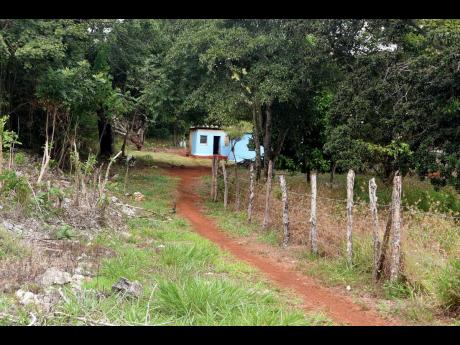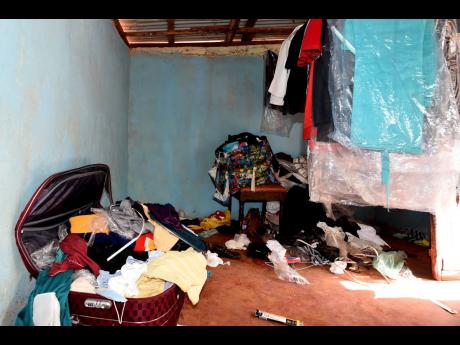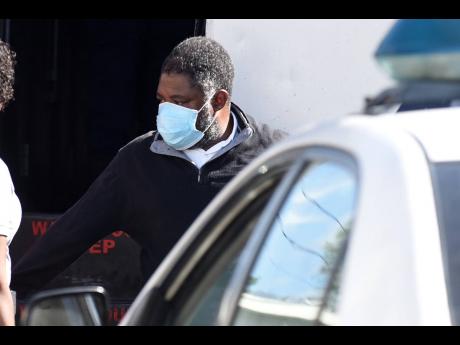Moise murder suspect likely US-bound
... fears fate of family if sent back to Haiti, says source
Haiti will not resist the United States’ attempt to claim custody of a suspect linked to last July’s assassination of President Jovenel Moïse being held in Jamaica, senior officials of the Haitian government have revealed as their own investigation continues to struggle.
“Haitian government wants John Joel Joseph to be extradited to Haiti. But as for now, it is recommended that he goes to the USA than be transferred to Haiti,” an official based in Port-au-Prince told The Sunday Gleaner.
There is no extradition treaty between Jamaica and Haiti, but unlike what happened in the recent case of Mario Antonio Palacios, Joseph could be deported to Haiti, his homeland, after legal matters he and his family face concerning illegal entry are wrapped up.
Palacios, who was held in Jamaica last October for illegal entry and was also being sought in connection with the July 2021 assassination of Moïse, was intercepted and arrested by US officials in Panama as he was being deported from Jamaica to his home country, Colombia, earlier this month.
Joseph’s deportation flight could, however, take him directly into the US en route to Haiti, where he could also be held in Florida.
Jamaica and the US have an extradition treaty, but officials here, including Justice Minister Delroy Chuck and Director of Public Prosecutions Paula Llewellyn, say they are not aware of any requests from Washington for Joseph’s extradition.
US investigation into Moïse’s murder has been gaining momentum following its arrest and charge of Palacios, 43, and another key suspect, businessman and convicted drug trafficker Rodolphe Jaar, 49, who was last week deported from the Dominican Republic to the US.
The men have been charged with conspiring to commit murder or kidnapping outside the US and providing material support resulting in death, knowing or intending that such material support would be used to prepare for or carry out the conspiracy to kill or kidnap.
The two are the only ones charged in the US for their role in the assassination plot, but feverish diplomatic and security talks are reportedly under way to have Joseph, a former Haitian senator, who was captured in St Elizabeth on January 14, taken into US custody.
When Joseph, 56, and his wife Edume, 38, appeared in court on immigration charges last Thursday, Judge Lori-Ann Cole-Montaque further remanded them until February 15 after their attorney, Donahue Martin, said he needed more time because “there are particular discussions to be had”.
Martin was tight-lipped on Friday, declining to say whether what he calls “high-level” talks involved US law enforcement agencies.
An official in Jamaica’s Ministry of National Security said what was revealed about Palacios and US engagement in Jamaica is very likely to happen in Joseph’s case.
Following Palacios arrest, the US Department of Justice disclosed that while in detention here, Jamaican authorities facilitated an October interview between the suspect and Michael Ferlazzo, a special agent with the Federal Bureau of Investigations.
According to Ferlazzo’s affidavit that was filed in a Florida court, Palacios provided “voluntary statements” in which he admitted his role in the plot, which included an initial aim to “capture” Moïse, but was later changed to an assassination.
Similar efforts are believed to be under way or are being explored with Joseph, but his case is complicated by his family as his wife and two children were also held with him in the community of Warminster.
The normal route for persons who enter Jamaica illegally would be an almost certain conviction in the courts, the payment of a fine or brief prison term, followed by deportation.
Joseph is reportedly concerned about his family and their safety if he ends up in the US and they are deported to Haiti, said an official who asked to remain anonymous as he was not authorised to speak on the matter.
Joseph, an opponent of the Tet Kale party that Moïse belonged to, was listed among five “fugitives” for whom Haiti’s Justice Minister Rockefeller Vincent said the country would offer six million gourdes for their arrests.
He allegedly paid in cash for rental cars used by the attackers and had met with other suspects ahead of the killing, according to a leaked 122-page police investigation report seen by The Sunday Gleaner.
It is also alleged that Joseph introduced other suspects to Joseph Badio, an alleged leader of the plot who worked for Haiti’s justice ministry and a government anti-corruption agency until he was fired.
An extradition treaty would make Haiti’s claim stronger.
Justice Minister Chuck said he was not aware whether any steps have been taken to initiate one, but speaking generally, he said Jamaica has interests in those diplomatic and security tools.
“We should always have reciprocal treaties with as many countries as possible once they have a proper legal system. With Haiti, you’re not too sure,” he said.
Concerns with the country’s legal system have been heightened by the controversial investigation of Moïse’s death, which, to date, has seen no one charged in the country in the matter bedevilled by claims of cover-ups and administrative bungling.
On Friday, Haitian judge Garry Orelien, who was assigned last August to oversee the investigation, advised that he was withdrawing from the case after his mandate ended in December and was not extended.
Orelien complained that he was not getting support from Haitian institutions.
More than 40 people, including 18 former Colombian soldiers, have been arrested in the July 7 killing of Moïse, who was shot several times at his private residence in an attack that also injured his wife, Martine Moïse.
Associated Press reports contributed to this story.



